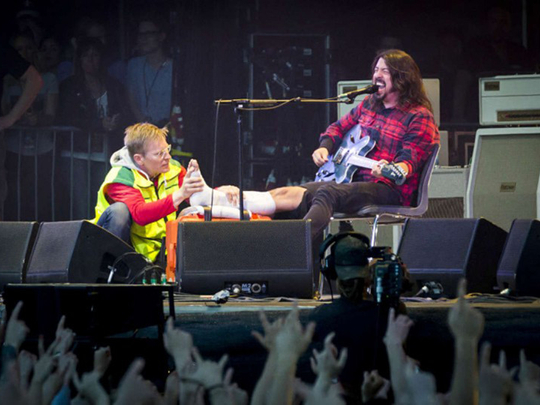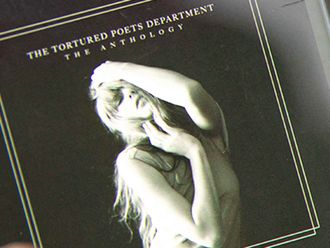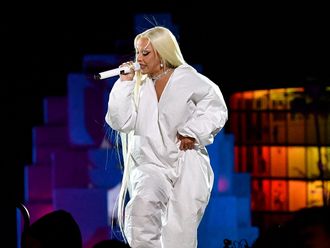
Even before he fell off a stage in Sweden and broke his leg, Dave Grohl was feeling creaky. He is 46, drinks too much coffee, and wakes up at 6am wherever he is, even on days he doesn’t need to pack lunches and get the kids into the Honda Odyssey. When he’s touring, his back aches and the muscles in his neck hurt from screaming.
“The pre-show now is, like, a couple whiskies and a couple Advils,” he said with grinning derision one day in May.
When his Foo Fighters play RFK Stadium in Washington, D.C., on July 4, the 20th anniversary of the band’s first album, it will be their first time playing since Grohl’s June 12 accident forced them to cancel the remainder of their European tour.
Even with a freshly broken leg, he insisted on being carried back onstage (after getting medical attention) to finish the Sweden show.
And in conversation, he has the tensed energy of a stalking cat. Grohl is a man of delightfully meandering anecdotes, most of which are tame save for a recurrent verbal tic that rhymes with “muck” and serves as the equivalent of “um”. His appetites are wide-ranging and ravenous. At one point during an interview in the cafe of the Park Hyatt, to make a point about the power of music to connect, he expounded upon the lyrical beauty of the quintessentially cheesy ’70s pop hit “Escape (the Pia Colada Song), which he learned to appreciate only recently, when it came on the radio while he was stuck in traffic.
“Then, the third verse they decide to meet — so they meet, and it’s his wife!” he exclaimed, leaning forward in excitement. “He’s like, ‘I had no idea you liked pia coladas and getting caught in the rain,’ and then they fall back in love!”
Whoa.
“Actually listened to the music,” he said with satisfaction. “Now I’m totally down.”
By this point, the conversation had already touched on the craft shows Grohl’s mum took him to as a child and the time an image of the murderous cult leader Jim Jones inadvertently wound up painted on the teenage Grohl’s bedroom wall. (It’s a long story.) The onetime Nirvana drummer has said that he was essentially anonymous back when he played with Kurt Cobain and Krist Novoselic. But over the years he has figured out how to reside in the limelight without revealing too much, using humour and hyperbole to defuse interviewers’ deep questions about Cobain and the meaning of rock ‘n’ roll.
His talent for putting people at ease is part of the reason profiles inevitably call him the nicest man in rock, a phrase often conveyed with surprise, since people expect their musical heroes to come with a side of angst, ethical lapses and bizarre backstage demands.
Instead, Grohl and his bandmates are winningly adorkable in a way that suggests they have little to prove. They are fully domesticated rock stars. Grohl gave up drugs when he was about 20, and his greatest vice appears to be caffeine. He talks about helping his nine-year-old daughter redecorate her bedroom to reflect her improbable love of Queen. (He has two other kids, ages six and almost one.) His bandmates talk about the night they rented a limo van to shuttle them to back-to-back fundraisers at the private schools that assorted Foos offspring attend.
‘Behind the music’
Grohl’s stories are laced with self-deprecating humour. There was the first and only time he tried yoga, on the day after a big show, and nearly threw up doing downward dog. There was the time, about six years ago, when he started having chest pains. He was 40 and thought he might be dying, but instead of going to the doctor he played a scheduled show at the White House, with two Bayer aspirin in his wallet in case of a heart attack.
“I actually thought, if I die while playing on the South Lawn of the White House, I mean, imagine that Behind the Music,” he said.
When he didn’t die, Grohl visited some doctors who gave him an EKG, a sonogram and a CT scan. His heart was fine, it turned out; the culprit was his coffee consumption. With two little kids at home, he was sleeping little and drinking four pots a day.
There’s a certain logic to Grohl playing the White House through chest pains, or playing a stage in Sweden with a broken leg. Music is not only his career but a religion of sorts. “Nothing makes me feel more like a human being on planet Earth than listening to My Bloody Valentine or [expletive] Al Green or the Beatles or Slayer,” he said. Declaring something “rock ‘n’ roll” might be the highest compliment he can pay. (The Foo Fighters were in New York in May to perform on the final episode of Late Show With David Letterman; Grohl has described Letterman as having “something rock ‘n’ roll about him”.)
The preservation of rock history, as well as the effort to define what rock is and isn’t, have been causes of Grohl’s in recent years, inspiring his 2013 documentary Sound City, about the legacy of a storied-but-forgotten studio featuring an outdated analog soundboard, and his 2014 HBO documentary series, Sonic Highways, a city-by-city take on the history of American music. The Foo Fighters even struck a blow for the old school, recording their 2011 album in Grohl’s garage.
“When that album, Wasting Light, came out,” drummer Taylor Hawkins said in the same cafe on another day, “everyone came up to us and said, ‘Man, that record sounds so good.’ I said, ‘That’s because it sounds like a record — it doesn’t sound like someone did it on their (expletive) laptop.’”
The Foo Fighters have a love for vinyl and for a certain sound — That summer-of-’69 [expletive],” Grohl calls it — that is disappearing. Some music heads loudly bemoan the loss of this sound, irritating other music heads who see guitar nostalgia as a narrow-minded exaltation of old-white-guy rock over newer forms.
But while the rock-ism wars have been noisy and fierce, Grohl has somehow remained unbesmirched. His ubiquity at red-carpet events may be mocked in some circles, and his promiscuous tastes in side projects and collaborations — from Tom Petty to Diddy — prompted Maxim to joke that he’d “been in more bands than chlamydia.” But somebody has to be the face of contemporary rock, or whatever’s left of it — and everyone seems to agree that there couldn’t be a nicer guy for the job.
‘100% nice’
Grohl has a gee-whiz quality that can seem like a put-on - he once expressed shock that Kenny G knew who he was and claimed to have almost fainted upon seeing Barry Manilow in an airport — and the internet abounds with stories gushing about his kindliness. (“Dave Grohl Stops Foo Fighters Show to Give Gift to Blind Fan.”) On a website called Mean Stars, Grohl gets a rating of “100% nice” from average folks who’ve crossed his path (“he spoke at length with our moms”; “he wished me the best of luck with the cancer treatment”). A recent biography of Grohl was criticized for having too little Grohl in it - perhaps, one reviewer suggested, because he’s too nice to make for an interesting subject.
That seems a little unfair, though, because Grohl doesn’t come across as the least bit boring - just deeply earnest. The son of a single mom who at one point worked three jobs, Grohl and his sister grew up in Springfield, Virginia, and as a teenager he became enmeshed in the local punk scene. He never imagined a career in music, never imagined there was money to be made selling cassette tapes or “playing squats and running from skinheads.” By the time he was playing drums for the hard-core punk band Scream in his late teens, he was just working to support the music.
“I never needed much to be happy, so working at Marlo Furniture warehouse and playing music on the weekends and begging my boss for my job back when I’d come home from tour - that’s just how I imagined it was going to be,” he said.
Instead, he found himself broke in Los Angeles in 1990, when Scream’s shows were cancelled, he said, because the bass player disappeared. He was “eating pork and beans with mud wrestlers” (another long story for another day) when a friend called to say a Seattle band was looking for a drummer and liked his style. Conflicted over leaving his bandmates, Grohl called his mom. She told him, “Sometimes, you just have to do what’s good for you.”
Nirvana hit the big time not long after he joined the band, and those years are familiar pop-culture territory. Grohl has said that he escaped home to Virginia whenever he “felt sucked into the tornado of insanity.” When Cobain killed himself in 1994, Grohl said he became depressed and couldn’t listen to the radio, let alone play.
“I couldn’t even imagine getting behind a drum set, because it would just sort of keep me emotionally in that place,” he said. But over time, he realised music could be the path out of that sad, stuck feeling. He recorded some songs he’d written and handed cassette tapes out to friends. That ultimately led to the release of the first Foo Fighters album on July 4, 1995.
Grohl was lying next to his wife in bed the other night when she came across the recent Cobain documentary, Montage of Heck. He was “terrified,” he said, and figures he caught the one portion of the movie — a sliver in the middle — he could stand to watch. “All the footage of him as a child, I think that might make me sad, and then the dark stuff at the end I think would bum me out,” Grohl said. So after 10 minutes, he rolled over and went to sleep. And anyway, he had to be up at 6 to take the kids to school.
The Foo Fighters are now in their middle-aged, classic-rock phase. A few years back, they sold more than 170,000 seats during two nights at London’s Wembley Stadium, and Grohl has embraced their bigness in a way that contrasts with how Nirvana’s frontman handled its success. Cobain was famously uneasy with fame, and unhappy with the press’ portrayal of him as the voice of a generation. Grohl hasn’t felt so conflicted, though he, too, was raised in a punk scene that set commercial success at odds with musical purity.
“The simple love of making music” is his touchstone, he said, and he returns to it again and again when considering new projects. It helps that he doesn’t feel forced to do anything. “We’re on my label,” he said. “We record at my studio, or other places. We own our entire catalogue. I just license it.” If the Foo Fighters play a big show at a festival with a Heineken label over the stage, Grohl said, that’s balanced by the fact that he “got 75,000 people to sing ‘My Hero’ and ‘Best of You’ with me, and gave them the [expletive] night of their lives.’”
Given that they’ve spent the past two decades doing interviews, Grohl and his bandmates come across as delightfully unpolished. The frontman meanders, thinking through questions aloud, confessing upcoming projects and then backtracking when he realizes his offhand comments translate into major announcements.
In a separate interview, Hawkins managed to spill the beans on the band’s top-secret performance that night on Letterman, then denied it, then writhed sideways on the banquette in mock pain. (“I’m the worst. I do it every time,” he said, then dug his hole deeper, mentioning another recent problematic interview: “I said U2’s album sounded like a fart by accident, and I didn’t mean it like that.” What did he mean? “I meant that... [expletive], I can’t believe I’m talking about this.”) Shortly after that, bassist Nate Mendel, who had overslept, came down to join the interview, gently chastising Hawkins for being “fussy” by asking the waitress for coconut water.
The fact that the Foo Fighters hit the rock ‘n’ roll lottery in time to preside over the waning of the genre as the country’s dominant commercial music form gives a certain poignancy to their discussion of what rock should be. Grohl said his concern about the state of music doesn’t stem from being anti-technology or closed off to musical innovation — he played drums with the EDM group the Prodigy, for goodness sake. Rather, he said, he’s making a point about the overzealous production of contemporary music, about tastemakers on The Voice getting to decide what’s good, about kids with their own sound being coached into the sameness of commercial radio, about the lovely imperfections of voice and instrumentation being thrown into computers and manipulated “so that it sounds perfect”.
In many ways, this is a very old debate over what constitutes authenticity in music. As a kid, Hawkins liked the Bee Gees, “and my dad was like, that is the lamest [expletive] I’ve ever heard,” the drummer said. It’s a debate still worth having, even if Grohl’s positioning of himself as keeper of the rock flame can sometimes make him sound like your dad.
Rock‘n’roll spokesman is the ultimate side project, though Grohl would reject the notion that he’s vying for such a title. But it’s clear he likes having a lot to juggle. Grohl’s bandmates say he keeps things tense on purpose. Sleeps too little. Schedules too much. Drinks coffee till he’s jumping out of his skin. Thrives on the constant state of functional agitation.
Maybe this is what passes for normality in a rock ‘n’ roll lifestyle, even if it does occasionally manifest in a broken leg.













